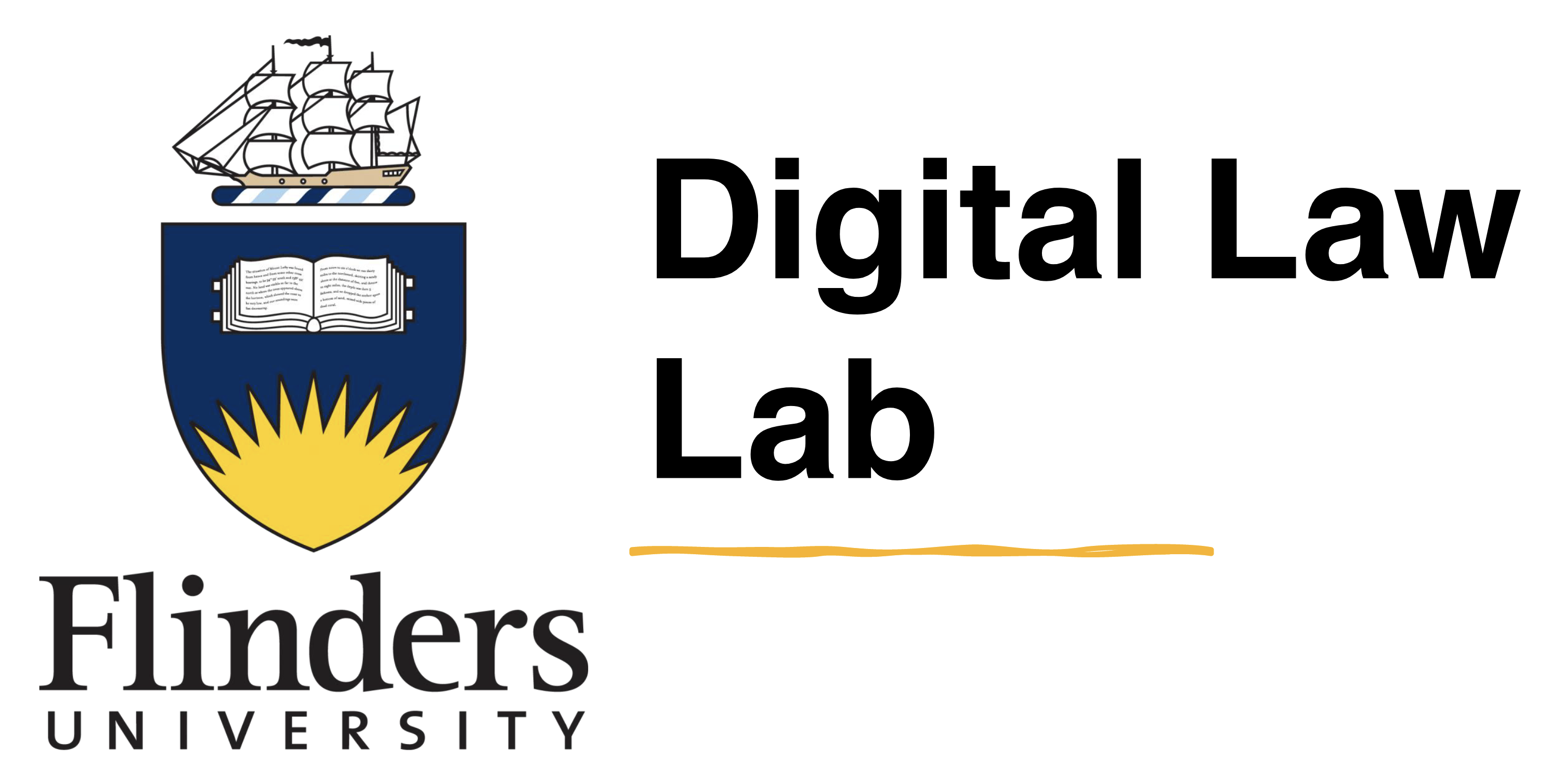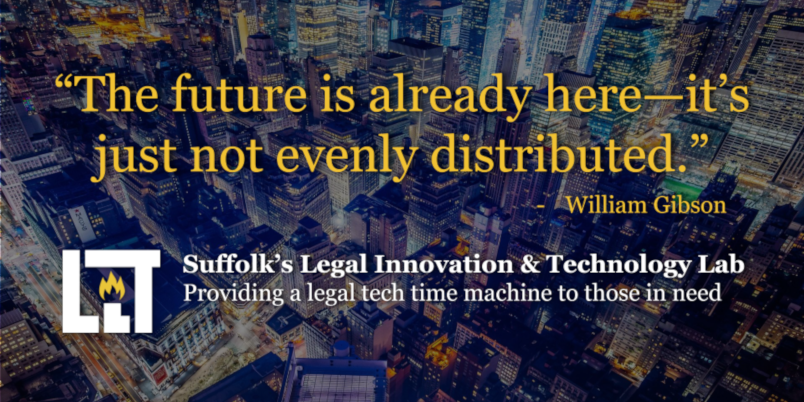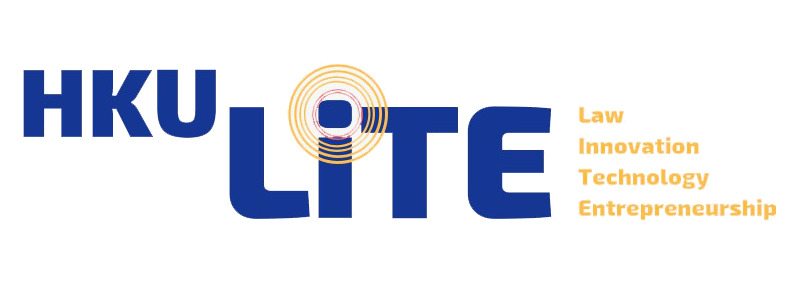
2021 Global Law Lab Showcase & Meetup
May 12, 2021 at 00:00:00 UTC (GMT)
On May 12th, or May 11th depending on your timezone, a collection of law labs from across the globe have decided to gather for a virtual breakfast/cocktail reception/meetup. Unfortunately, attendees will have to bring their own food and beverages as the meetup will take place on Zoom. We will provide a number of breakout rooms and the goal is to meet and chat with folks from law labs around the world. "What's a law lab?" you ask. Check out each lab's description below (the showcase) to get a feel for their work, and plan who you would like to meet with on the 11th/12th at the meetup.
That's 5 pm on May 11 in Tucson; 7 pm on May 11 in Nashville; 8 pm on May 11 in Boston, Durham, East Lansing, & South Royalton; 8am on May 12 in Singapore & Hong Kong; and 9:30 am on May 12 in Adelaide.
Suffolk University Law School's Legal Innovation & Technology (LIT) Lab (US)
The Legal Innovation and Technology (LIT) Lab is an experiential program combining the vision of our Legal Innovation and Technology Institute with the pedagogy and legal services mission of our Clinical Programs. The Lab allows students to work as part of a consultancy and research & development (R&D) shop focused on legal tech and data science work. Active areas of research involve, but are not limited to, the construction of expert systems/guided interviews (e.g., chatbots) and algorithmic codification of tacit knowledge (i.e., training computers to replicate human decisions).
Lab students develop legal technology and data science solutions for organizational clients (e.g., legal aid organizations, courts, firms, and non-profits), helping them improve efficiency and effectiveness. Theses services are provided to organizational clients, who frequently do not have in-house expertise in automating tools, engaging in process improvement, and data analytics.
University of Hong Kong’s LITE (Law, Innovation, Technology and Entrepreneurship) Lab (Hong Kong)
Law, Innovation, Technology and Entrepreneurship Lab (LITE Lab) is an interdisciplinary and experiential programme led by the University of Hong Kong’s Faculty of Law in conjunction with the Department of Computer Science.
Like the lean startups it works with, LITE Lab@HKU has evolved since its founding in 2019 (see Artificial Lawyer article) and currently prepares the legal professionals of the future by offering undergraduate and postgraduate law students as well as those from other university disciplines numerous curricular and extracurricular opportunities to:
(1) learn entrepreneurship in and through the law, including through their roles in what we call a 21st century law review creating blogs, infographics, animated video explainers and document automation for LITE Lab@HKU’s upcoming website revamp that aims to benefit under-resourced organisations;
(2) engage with and support the Hong Kong tech startup and innovation ecosystem through co-designed student research and internships (more than 70 to date), often involving emerging technologies, business models and the law; and
(3) co-design impactful proof-of-concept lawtech solutions with NGOs, social entrepreneurs and the private sector. Our students have already created internationally recognized access-to-justice projects (eg, 2020 Georgetown Law Iron Tech Lawyer Invitational), launched lawtech startups, and are working with leading regional corporate counsel on their legal automation painpoints as part of a new innovative collaboration initiative which has been shortlisted by FT Innovative Lawyers 2021.
LITE Lab@HKU faculty also engages in scholarly research in areas such as AI governance (eg, Wiley’s The AI Book, The Legaltech Book The Regtech Book and The Fintech Book) as well as legal innovation and technology industry studies with organisations such as the Association of Corporate Counsel and the Asia Pacific Legal Innovation and Technology Association (ALITA).
Lab Website Video of LITE Lab student lawtech project (Iron Tech Lawyer Invitational 2020 winner) Video of LITE Lab 2020-21 courses Video of LITE Lab 2019-20 courses
Singapore Management University’s Centre for Computational Law (Singapore)
The Centre for Computational Law (CCLAW) is a research centre at the Yong Pung How School of Law, Singapore Management University (SMU). CCLAW’s research team comprises researchers with varying backgrounds in computer science, law and linguistics.
CCLAW’s main research project is the Singapore government-funded Research Programme in Computational Law, which involves the study and development of open source technologies for ‘smart’ contracts and ‘smart’ statutes (Rules as Code), beginning with the design and implementation of a domain-specific programming language (DSL) (named ‘L4’) that allows for laws, rules and agreements to be expressed in code (https://github.com/smucclaw).
Other research projects at CCLAW touch on one or more of the following areas: Natural Language Processing and Machine Learning, Data Analytics and Computational Legal Studies, Technology and Access to Justice, and Legal Design. CCLAW faculty also instruct and facilitate courses that empower law students with digital skills and bring together cross-disciplinary teams to tackle justice-related issues:
- LAW 4019 Computational Thinking and Legal Technology,
- COR-LAW2215 Digital Intelligence for Lawyers
- LAW4022 Digital Innovation for Access to Justice (the ProbateHelpers app that the student team developed using Docassemble tied for 2nd place in the recent Iron Tech Invitational 2021)
SMU also recently launched the BSc (Computing & Law) degree, a single integrated specialist degree that has subjects curated for the contextualization of law and technology and vice versa, and designed to produce professionals with interdisciplinary expertise in law and technology.
Flinders University's Digital Law Lab (Australia)

The Flinders University Digital Law Lab was established in February 2021 and provides legal technology services to not-for-profit and government organisations primarily in South Australia.
Designed with the purpose of ‘closing the loop’, the Digital Law Lab provides ongoing maintenance for legal software applications developed by Flinders University law students.
All students studying a law degree at Flinders University are required to study LLAW3301: Law in a Digital Age. In Digital Age, students learn coding skills, using Docassemble, and are engaged by real-world clients to develop real-world applications with a view to improving access to justice. Since launching Digital Age in 2019, a number of student applications have been commissioned for day-to-day use by their not-for-profit clients, with many more in the pipleline.
The Digital Law Lab comes into play when a client decides to commission a software application written by Digital Age students. Interns in the Digital Law Lab work through the commissioning process, auditing the underlying law implemented by the app, making any changes requested by the client, and commissioning the application. After commissioning, the Digital Law Lab is tasked with providing ongoing maintenance to the commissioned apps, ranging from bug fixes, to ensuring the application code remains up-to-date with the underlying law as the law changes.
In this way the Digital Law Lab ‘closes the loop’. In combination with Digital Age, the Lab is part of an end-to-end solution for not-for-profit and government organisations that engage with Flinders University. Students develop new applications and those applications are supported and maintained on an ongoing basis, providing support to the access to justice community and improving access to justice through legal technology.
Univ. of Ariz. Law’s Innovation for Justice (US)
The Innovation for Justice Program (i4J) at the University of Arizona James E. Rogers College of Law is a social justice innovation lab that designs, builds, and tests disruptive solutions to the justice gap. Barriers to entry, power imbalances, and flawed processes exclude marginalized populations from effective use of the civil legal system and inhibit the system from delivering on the promise of justice for all. i4J’s interdisciplinary research teams apply design- and systems-thinking methodologies and engage in action-based research that exposes inequalities in the legal system and creates new, replicable strategies for legal empowerment.
i4J recognizes that change does not happen in silos; innovation calls for broad insight, engagement, and support. i4J's teams of interdisciplinary students collaborate with nonprofit, government, and private sectors, as well as lived-experienced experts, to create new models for delivering legal empowerment to underrepresented populations.
Through several community-engaged research opportunities, i4J students are exposed to the justice gap, trained to think critically about the power of technology and innovation to close that gap, and empowered to act as disruptive problem-solvers in the changing world of legal services.
Check out this video to learn more.
Program on Law and Innovation (PoLI)

Vanderbilt launched its Program on Law and Innovation (PoLI) in 2015 to train the next generation of lawyers to succeed in tomorrow’s legal environment by anticipating the opportunities created by the changes in law and legal practice. PoLI’s curriculum and activities focus on four related themes:
- The Legal Industry. Legal service providers of all sizes and types are restructuring and changing the ways their lawyers practice. Traditional law firms now compete for business with new types of legal service providers, including legal project management firms and document review shops. New legal jobs, such as legal risk consultants and legal knowledge managers, are now available.
- Legal Technologies. Computers are increasingly doing legal work, from reviewing documents for relevant information to predicting liabilities and litigation outcomes using computer algorithms. These technologies allow lawyers to deliver more efficient and reliable services and results. They also affect the demand for lawyers and the skillsets needed to deliver legal services.
- Legal Innovation and Entrepreneurship. Fueled by rapid social, economic, and technological changes, the demand for change in law is also on the rise. Existing regulations don’t address the issues raised by new technologies such as commercial drones, and new financial products that present uncertain risks demand new strategies for public oversight. Young lawyers with an entrepreneurial eye can quickly develop expertise in an emerging or evolving area of law.
- Access to Legal Services. Most people and businesses could not afford top-quality legal services in the past. As lawyers become more efficient and legal technologies more widely available, the availability of affordable legal services will open new markets for entrepreneurial lawyers and legal enterprises.
PoLI’s curriculum and activities expose Vanderbilt Law students to these and other changes in the legal industry that will have profound influence on the way they practice law.
PoLI’s newest venture is its Design the Law Lab, a cross-disciplinary design studio focused on co-creating access to justice solutions using the methods and tools of human-centered design. Housed at the Wond’ry, Vanderbilt’s center for innovation, the Design the Law Lab is launching in the fall of 2021.
Vermont Law School's Center for Legal Innovation (US)
The Center for Legal Innovation at Vermont Law School is the home to our Entrepreneurship Legal Laboratory which focuses on the creation of innovative scalable legal solutions for low-bono and pro-bono start-up clients. Our program has flourished by forging a relationship with the VtSBDC to provide legal education applications for small Vermont businesses. These applications are distributed state-wide and used by the VtSBDC advisors to assist their small business clients.
From a student learning perspective, students research the area of law that has been identified by the VtSBDC advisors as an area of need for their small business clients. With the guidance of faculty and local attorney practitioners, students create an application that addresses the legal needs surfaced by the VtSBDC. Through the efforts of our students, rural Vermont small businesses are given free access to the law.
The NuLawLab is the interdisciplinary innovation laboratory at Northeastern University School of Law. We are leaders in the emerging global Legal Design movement.
Our programs, projects, seminars, and research allow us to build cross-disciplinary teams and community-based partnerships focused on transforming legal education, the legal profession, and the delivery of legal services. We do this work at the leading public interest law school in order to provide our students with the knowledge and skills to be the legal inventors of the future.
Northwestern's Law and Technology Initiative (US)
The Northwestern University Law and Technology Initiative operates at the intersection of law and technology, including legal-services delivery technologies and laws and regulations governing technologies. Our vision for the Initiative is a partnership between Pritzker School of Law, McCormick School of Engineering, and external partners such as law firms, corporate legal departments, legal aid organizations, courts, other legal-services providers, legal technology companies, and information providers.
Our 2020-21 annual symposium, Law + Computation: An Algorithm for the Rule of Law and Justice?, featured a keynote by Michigan Supreme Court Chief Justice Bridget Mary McCormack and talks by twelve legal academics. In November 2020, we hosted the WorldCC Global Academic Symposium on Innovation & Technology in Contracting, which featured a keynote by 2016 Nobel prize winner Professor Oliver Hart and nine other academics and practitioners. Our 2020-21 monthly programs included Who is Responsible When Autonomous Systems Fail? and AI and the Future of Lawyering & Law Firms.
The Institute for Data, Econometrics, Algorithms, and Learning (IDEAL), in collaboration with the Law and Technology Initiative, is holding a Spring 2021 Special Quarter on Data Science and Law.
Northwestern University Law and Technology courses include:
- Innovation Lab (JD, LLM, MSL, & CS)
- AI and Legal Reasoning (JD & LLM)
- Law of AI and Robotics (JD & LLM)
- Assessing AI and Computational Technologies (MSL)
- Introduction to Law and Digital Technologies (CS)
- Law and the Governance of AI (CS)
- The Science of Law and Computation (CS PhD)
The Michigan State University Center for Law, Technology & Innovation (“CLT&I”)
The Michigan State University Center for Law, Technology & Innovation (“CLT&I”) has a proud history of pioneering the education of lawyers for the 21st century. CLT&I began as ReinventLaw, with a focus on data analytics in law and technology law, transitioned to LegalRnD, with an emphasis on technology law and legal process improvement, and continues those traditions while exploringd the intersection of law, technology, innovation, and practical skills for modern lawyers.
CLT&I alumni can be found in many of the newest alternative careers, from legal operations to legal process improvement and from innovation roles in law firms to key positions in legal technology companies.
In addition to courses in key technologies, CLT&I offers popular classes on Entrepreneurial Lawyering, where students go from a new legal business idea to a full business plan, and Delivering Legal Services, where students develop and explore new types of legal services.
CLT&I currently has three components:
The LegalRnD Lab leads the legal industry through the use of scientific research and development, organizational excellence, and technology and helps train the next generation of tech savvy lawyers.
The Innovation Hub works to link law students with entrepreneurial activities, clients, and related opportunities on MSU campus.
The Center for Law, Technology & Innovation Research Node seeks to provide timely, practical research at the intersection of law, technology, and innovation.
The Center for Law, Technology & Innovation also provides a variety of internal and external seminars and events, support the MSU Legal Technology Association for students, and has launched an online thought leader video interview series called “The Leading Edge of Law.”
The following classes are planned for the 2021 – 2022 academic year:
- Artificial Intelligence and Law
- Cybersecurity and Data Protection
- Delivering Legal Services
- E-discovery
- IP & Entrepreneurship Clinic
- New Technologies and the Law
Duke’s Center on Law & Technology (US)
The Duke Center on Law & Tech aims to understand, re-imagine, shape, and lead the next generation of tech-enabled legal practice and to employ the tools of the law, policy, and design to ensure that rapidly emerging technologies empower and ennoble all people, with initiatives such as:
• The Duke Law Tech Lab, a legal technology incubator program for entrepreneurs dedicated to expanding access to legal services. • The Access Tech Tools initiative, a collection of tech-development projects—driven by human-centered design principles—that collaborate with legal clinics to increase access to legal services and empower under-resourced communities. • The Digital Governance Design Studio, which aims to help communities build trustworthy relationships with the technology they depend on. • Duke LawNext, a set of curated enrichment opportunities allowing students and recent alumni to explore next-generation legal practice. Participants chose from three Pathways: (1) Tomorrow’s Digital Lawyer; (2) Legal Design, Innovation, & A2J; and (3) Lawyering in the Age of AI. • Duke Law By Design, an initiative to employ human-centered design principles and practices and accessible technologies to improve legal services in the local community and beyond



